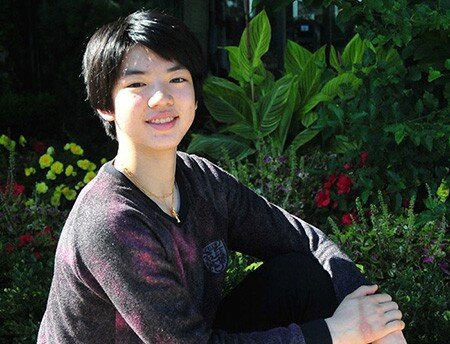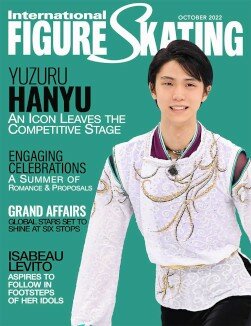
 Jun-hwan Cha is the latest skating sensation to come out of the Republic of Korea.
Jun-hwan Cha is the latest skating sensation to come out of the Republic of Korea.
At his Junior Grand Prix debut in Yokohama, Japan, in early September 2016, the 14-year-old claimed the top step of the podium in a runaway victory. Cha not only waltzed off with the gold medal, he also wrote a small piece of history by earning the highest combined score ever awarded at a junior Grand Prix event. He is the youngest man to have claimed this record under the current judging system.
Sitting in second after the short and a little more than a point behind Vincent Zhou of the United States, Cha was the last skater to take to the ice for the free program. His performance, which included a quad Salchow and seven clean triples, earned 160.13 points and a combined total of 239.47. His margin of victory over Zhou was 13.08 points.
“I was a little bit nervous in the short. On the warm-up, my jumps were not that good and it was not the way I practiced them. It was not good,” said Cha shaking his head. “The long program was better, but I had little mistakes with the Salchow and I rushed the flip. I was still nervous, but I just tried to do my best and it was OK in the end.
“I think what I liked most was that I skated well. That is more important to me than the score. I was a little surprised when my score came up. I was excited about breaking the World record.”
He scored a another runaway victory at his second event in Dresden, Germany, and headed to the Junior Grand Prix Final in Marseille, France where he landed in third. Another piece of history was written – it was the first time a Korean man had medaled at a junior Final.
Cha had been looking for a coach in North America and in March 2015 he went to Toronto to work on his jumps with Brian Orser. He enjoyed the initial experience and decided to make the Toronto Cricket Skating and Curling Club his full-time training base.
Last season, Cha won the junior division at the Skate Canada Autumn Classic. He placed fifth at the Youth Olympic Winter Games in Lillehammer, Norway, and seventh at the World Junior Championships in Debrecen, Hungary.
The two-time national junior champion has also captured two bronze medals at the senior level. In January 2017, the young dynamo claimed his first senior national title in a runaway victory. Age ineligible for senior Championship events this season, he was assigned to Junior Worlds.
Born in Seoul, Cha started skating seven years ago, and while it would be reasonable to assume that Yuna Kim’s success was a factor in him taking up the sport, Cha said that was not the case. “I was too young at that time and I did not watch television, so I did not really know anything about her,” he said. “I went to the ice rink sometimes, but at the end of 2009 I was at a vacation camp and I liked it so I started training.”
Cha has landed a quad toe in practice, but said that “it is still a little shaky and not ready to be included in my programs. I am also trying a quad loop. It is not bad, but the quality of the quad toe is better. I will practice those jumps. I am working on trying to get clean programs at all competitions, on landing clean quads and Axels, and I need to work on my expression so I have better presentation skills.”
He will move into the senior ranks next season. His goal is to earn a berth to the 2018 Olympic Winter Games, which will take place in his homeland. “I hope to be able to skate in PyeongChang. It will be very exciting because it is in my country,” Cha said. “When I go there for my first Olympics, maybe it will be good for me.”
Though he spoke some English before moving to Canada, with the help of English tutors and his coaches and training mates, he is now fluent in the language. “I study English. I could speak English before, but it was not that good,” he said with a laugh.
Off the ice, his time is spent working out at the gym and studying. The grade 9 student takes online courses to keep up on his schoolwork. Cha said that in order for him to be able to compete at nationals, he has to be enrolled in school.
He admitted that he has no idols, despite the fact that he trains with the top two men in the world. “I don’t have particular skaters that I like. There are a lot of skaters that I like because they all have different and good things that I can learn,” he said.
“I feel like I learn from Yuzuru (Hanyu) and Javier (Fernández). When I am training with them and sometimes I have a bad day and my jumps are not good, I watch them and it makes me work harder. I feel fortunate to train with the best skaters in the world.”
David Wilson choreographed both competitive programs for this season.
RELATED CONTENT:
2017 WORLD JUNIOR CHAMPIONSHIPS




